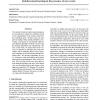Free Online Productivity Tools
i2Speak
i2Symbol
i2OCR
iTex2Img
iWeb2Print
iWeb2Shot
i2Type
iPdf2Split
iPdf2Merge
i2Bopomofo
i2Arabic
i2Style
i2Image
i2PDF
iLatex2Rtf
Sci2ools
104
click to vote
ICML
2008
IEEE
2008
IEEE
Reinforcement learning in the presence of rare events
We consider the task of reinforcement learning in an environment in which rare significant events occur independently of the actions selected by the controlling agent. If these events are sampled according to their natural probability of occurring, convergence of conventional reinforcement learning algorithms is likely to be slow, and the learning algorithms may exhibit high variance. In this work, we assume that we have access to a simulator, in which the rare event probabilities can be artificially altered. Then, importance sampling can be used to learn with this simulation data. We introduce algorithms for policy evaluation, using both tabular and function approximation representations of the value function. We prove that in both cases, the reinforcement learning algorithms converge. In the tabular case, we also analyze the bias and variance of our approach compared to TD-learning. We evaluate empirically the performance of the algorithm on random Markov Decision Processes, as well...
Function Approximation Representations | ICML 2008 | Machine Learning | Rare Event Probabilities | Reinforcement Learning Algorithms |
| Added | 17 Nov 2009 |
| Updated | 17 Nov 2009 |
| Type | Conference |
| Year | 2008 |
| Where | ICML |
| Authors | Jordan Frank, Shie Mannor, Doina Precup |
Comments (0)

